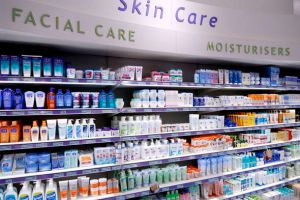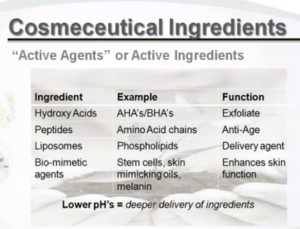Over the Counter Skincare vs. Cosmeceuticals...You Get What You Pay For!
- Angel Brant-Flener, LE/CSc
- Sep 8, 2015
- 4 min read
Over the Counter Skincare vs. Cosmeceuticals...you get what you pay for!
I've said this to clients more times then I would like to admit in the 10 years Ive been in Aesthetics and clinical Skincare. But its so true! And in most cases Sad but True.
So when I speak of "OTC"s" many of my clients ask, “What’s the difference between an over-the-counter (OTC) skin care product and a professional or cosmeceutical skin care product?” The following is a brief explanation which I hope will clear things up for you as one of my clients.
OTC's and the FDA
We’ve come to learn over time, OTC products are regulated by the U.S. Food and Drug Administration or "FDA." These products only are able to penetrate the first layer of your skin, the "stratum corneum" or “dead, upper layer” of our skin. Professional products, also known as "cosmeceuticals" are not controlled by the FDA and penetrate the deeper layers of the epidermis… aka “live tissue”.
You see, the FDA recognizes two categories of beauty products/cosmetics : Pharmaceutical and OTC cosmetics. The difference? Pharmaceuticals penetrate through the layers of the epidermis and affect the structure and function of the skin (think of prescription topical steroids or Retin-A). The offical FDA verbiage is the following:
“Articles intended for use in the diagnosis, cure, mitigation, treatment, or prevention of disease” and “articles (other than food) intended to affect the structure or any function of the body of man or other animals” [FD&C Act, sec. 201(g)(1)]
WOW! When was the last time you thought that your skincare therapist could be "mitigating" your acne or hyper-pigmentation? On the other hand "OTC's" are used by many consumers to self-diagnose”. So when clients read about a product in a magazine and go into a department or drug storee, these products must be made safely. You see, big cosmetic companies cannot afford to have a huge number of consumers with issues from using very active products — so, that skin care product may feel good and smell good, but, most likely won’t have a lot of activity in its formulation. Also, since cosmetic companies really don’t have to prove efficacy, the special active ingredient listed in the formula only has to appear somewhere on the ingredient list!
What most consumers don't understand is that ingredients appear on labels in content order, from most to least, so if you see that ”active” on the last half of the list (usually alphabetically) you can bet you are getting a tiny percentage. My clients that read labels are savvy enough now to think is there enough of the effective ingredient to be effective in the formulation?
Lastly, OTC cosmetics are also manufactured and distributed in very large batches, and are packed with almost as many preservatives as “active” ingredients! Many over-the-counter cosmetics simply do not penetrate the skin barrier, where the ingredient formula would have a therapeutic benefit to the skin. Even your products sold through places like Sephora, Macy’s, Nordstrom, & Saks are all considered OTC!

Cosmeceuticals on the Other Hand...
The term “cosme-ceutical” was coined in the late 1990s. It comes from cosm(etic) + (pharma)ceutic. Basically, a cosmetic product claimed to have medicinal or drug-like benefits. Cosmeceutical products are categorized and marketed as cosmetics, but reputedly contain biologically active ingredients. While drugs are subject to a review and approval process by FDA, cosmetics are not. In other words, the formula does not technically have to prove efficacy or safety, but it does contain an ingredient that may have activity in the skin
As within my practice,it’s not just about one really fabulous ingredient, or one fabulous tool or technique that makes the product WORK! Its the use of the right amounts of active ingredients working together that works best in the skin, similar to how oral multivitamins work internally in our bodies with a mixture of vitamins and minerals for best absorption. (Please discuss ingestibles with you Primary Care Physician)

So, since it is out of the scope of an aesthetician to prescribe pharmaceutical products, offering a well formulated and tested cosmeceutical line, like Neutriceuticals or Skin Scipt RX products, is the next best option to pharmaceuticals. Cosmeceuticals that are professionally recommended by a licensed skin care professional generally have a higher amount of active ingredients with proven and safe formulations, and offer delivery systems that reach targeted cells in the skin. To put it simply… It really works and you will see results!
Here is a common list of ingredients found in most cosmeceuticals:
Alpha Hydroxy Acids
Peptides
Retinols
Glycolic Acids
Lactic Acids
Salicylic Acids
Alpha Lipoic Acid
Vitamin C-Ester
Enzymes
Resorcinol
Human Growth Factor
Stem Cells
....and I could give you examples all day long! So for those who experience "burning" or "itching" and irritation after a professional treatment it is not something that the aesthetician did incorrectly, it could be how long you have used an OTC product and how your skin and the remnants of the OTC products responded when a professional of cosmeceutical product was used. An aesthetician will be happy to sit down with you and analyze the facets or your care and will ALWAYS refer back to a client intake form that was filled out prior to your treatment. Much like the difference between a professional skin therapist and a facial person, the professional will have you fill out forms prior to your treatment to make sure you are getting the proper treatment for your skin....Mind, Body Wellness.

Looking forward to Fall and the coming of our Pumpkin Enzyme Anti-Aging Treatments! Don't forget about my Aloha Friday Deep Cleanse Specials as well! Angel
The Skin Coach
^j^




























Comments